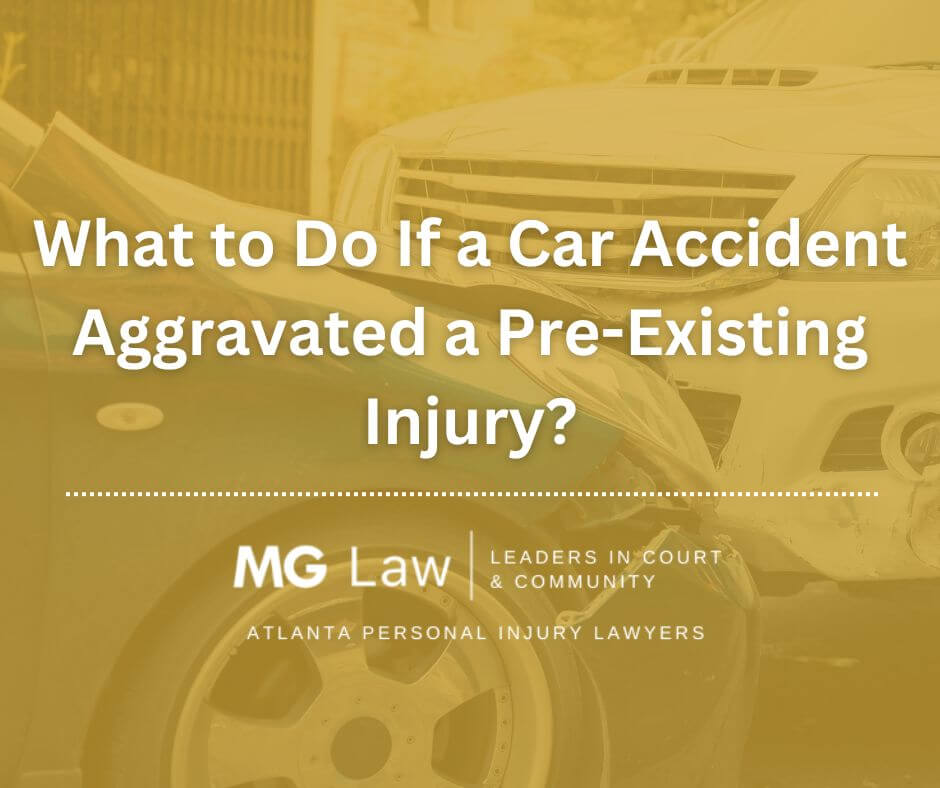
If you’ve been in a Georgia car accident and have a pre-existing condition, you may have many questions. Can I get a car accident settlement for a pre-existing condition? How does my pre-existing condition affect my personal injury claim? While insurance companies may attempt to use your condition to reduce or deny compensation, Georgia law protects your right to recover damages for any aggravation caused by the accident.
For a complimentary consultation, feel free to reach out to MG Law at (770) 988-5252 at your earliest convenience.
Defining Pre-Existing Conditions with Examples.
A pre-existing condition is any medical or mental health issue you had before the accident. Pre-existing conditions include chronic illnesses like asthma and past injuries like a sprained ankle.
Some common examples include:
- Back or spinal injury. A pre-existing back injury could be exacerbated by the impact, leading to increased pain, muscle spasms, and mobility limitations.
- Diabetes. An accident can disrupt diabetes treatment and cause complications such as infections, nerve damage, or kidney problems.
- Heart disease. An accident can increase your risk of having a heart attack, stroke, or other heart problems, especially if you already had them before the accident.
- Arthritis. The force of a collision can aggravate arthritis, causing increased inflammation, pain, and stiffness in the affected joints.
- Mental health conditions. The stress and trauma of a car accident can trigger or worsen anxiety, depression, and PTSD in individuals with pre-existing mental health conditions.
An accident can exacerbate these conditions, leading to increased pain, complications, and treatment needs.
The Impact of Pre-Existing Conditions on Car Accident Claims in Georgia
A pre-existing condition doesn’t prohibit you from pursuing compensation after a car accident. Under Georgia’s Eggshell Plaintiff Doctrine, defendants take plaintiffs “as they are.” The at-fault driver is responsible for the full extent of the harm caused, even accounting for pre-existing conditions.
For example, you had a stable back injury that didn’t cause you much pain before the accident. However, you experienced severe pain after the accident and needed surgery. As a result, you can seek an aggravated injury settlement, for the difference between your pre- and post-accident conditions. But you can’t claim damages for the original injury before the accident.
How to Show that a Car Accident Aggravated a Pre-Existing Condition?
Aggravation of a pre-existing condition signifies the accident worsened your pre-existing condition.
Proving the aggravation of a pre-existing condition requires providing evidence, including:
- Medical records from before and after the accident demonstrating a worsening of the pre-existing condition.
- Your doctor’s testimony explaining how the accident’s impact is directly linked to the worsening of your pre-existing condition.
- Witness statements from anyone who saw your pre-existing condition and its worsening after the accident.
- Imaging tests including X-rays, MRIs, or other scans providing visual evidence of the aggravation, especially for conditions like arthritis or back injuries.
Any evidence showing that your pre-existing injury was aggravated in a car accident could be beneficial in securing a car accident aggravated pre-existing condition settlement.
Can You Recover Compensation Even with a Pre-existing Condition?
If you can prove aggravation of a pre-existing condition, you may be eligible for compensation covering:
- Medical expenses. All additional treatment costs due to the accident worsening of your condition.
- Lost wages. If your pre-existing condition worsened to impact your ability to work.
- Pain and suffering. The physical and emotional distress caused by the accident’s impact on your pre-existing condition.
An experienced attorney can assess your potential compensation and help you navigate the legal process to ensure you receive the maximum amount you are entitled to.
Four Steps to Take if Your Pre-Existing Condition Is Aggravated
The following steps can help you protect your rights and recover maximum compensation after a car accident:
- Seek immediate medical attention. Document any changes in your condition and inform healthcare providers about your pre-existing injuries.
- Document the accident scene and injuries. Take detailed photographs of the accident scene, vehicle damage, and any visible injuries. Keep a comprehensive record of medical treatments, prescriptions, and other relevant expenses related to the aggravation of your pre-existing condition.
- Consult with an experienced Georgia personal injury attorney. Proving that the car accident aggravated your pre-existing condition can be difficult and complex without legal assistance. Look for a lawyer experienced in handling auto accidents involving pre-existing conditions. They can assess the unique aspects of your situation and guide you through the legal process.
- Make sure you receive immediate and consistent medical care. Prioritizing your health and following your doctor’s treatment plan diligently is essential. Obtaining consistent treatment shows a commitment to recovery and strengthens your claim by demonstrating the severity of the aggravation. Remember, gaps in treatment can be exploited by the defense, potentially weakening your case.
Recovering after a car accident with a pre-existing condition can be difficult. By understanding your rights and taking the necessary steps, you can hold the responsible party accountable and seek the compensation you deserve.
MG Law Is Here to Help.
Our Georgia personal injury lawyers have a proven track record of successfully representing car accident victims with pre-existing conditions, resulting in the compensation and justice they deserve. We understand the difficulties you face in seeking justice while recovering from your injuries. Please don’t hesitate to contact MG Law at (770) 988-5252 for a free consultation.

